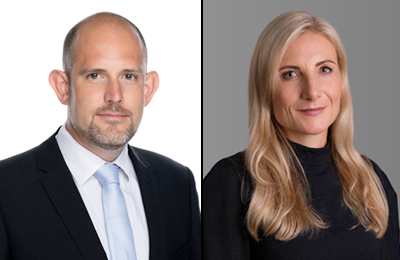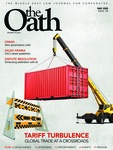Exploring dispute resolution in the MENA ahead of LIDW24

Leading up to London International Disputes Week (LIDW) 2024, Luke Tucker Harrison, co-chair of LIDW24 and partner at Keidan Harrison, and Anneliese Day KC, silk at Fountain Court Chambers talk to the Oath about the key highlights of the upcoming event and the progressive evolution of disputes work in the UAE and Saudi Arabia considering recent developments.
(To Luke) We understand that amongst delegates from outside of England and Wales LIDW23 attracted a large number of delegates from the UAE and wider GCC region, why do you think that is?
Since its inception in 2019, LIDW has attracted a large number of delegates from the UAE and wider GCC region. It is perhaps unsurprising given the heritage of English law and common law traditions shared with the offshore courts in the UAE that there is a close relationship with London. The region also plays host to a large number of English trained practitioners and more recently the SQE route to qualification as a solicitor has gained popularity with foreign lawyers who work in the region.
The English bar also regularly appear in the ADGM and DIFC Courts and in arbitration working closely with both international firms and local firms form the region. LIDW is a fantastic opportunity for practitioners from the region to connect and share knowledge with members of the bar forging collaboration. The spirit of collaboration courses through the veins of LIDW and has contributed to a growth in the resolution of international disputes locally, particularly in the GCC, by local practitioners but with the assistance of specialist expertise drawn from London.
English arbitrators also continue to regularly sit in GCC seated arbitrations and are often favoured by parties for their thorough approach and trusted neutrality. Many who sit in the region will have spent part of their career there as counsel before developing their practice as neutrals. There are also a growing number of mediations in the GCC facilitated by London based mediators.
(To Anneliese) We are aware you have worked on matters emanating from the UAE for many years. How have you seen the profile of disputes work there change in recent times?
Over the past 15 years, the profile of disputes work in the region has changed beyond all recognition. When I started appearing as advocate in the UAE, the market was dominated by construction work. Now the matters being determined in the UAE cover all areas of commercial work, including civil fraud, shareholder disputes, professional negligence (including some high-profile audit claims), hospitality disputes, infrastructure disputes, insolvency and restructuring, aviation, insurance, banking (particularly enforcement of bonds and guarantees), financial crime and investigations, regulatory and technology related work. The DIFC has been kept extremely busy with interim application work (perhaps greater than any other region I practise in) with jurisdictional, injunctive and enforcement decisions playing a vital role in raising the profile of the region.
The interplay between the local and offshore courts has been a constant theme and indeed at times a challenge for clients and lawyers alike. Arbitration in the UAE has had something of a chequered history but now appears to be in a more settled phase with increasing amounts of commercial as well as energy and infrastructure disputes being dealt with by Tribunals. There is also greater cross over than ever before with other regions, and in particular with the Offshore, Indian and Asian markets. The future looks very bright for the UAE as a centre of international dispute resolution.
(To Luke) LIDW features a number of speakers and sessions focused on the MENA region, can you tell us more about that?
Disputes with a MENA nexus is a “hot topic” for this years LIDW. The week starts with International Arbitration Day which features a panel focused on the MENA region hosted by Covington & Burling. The main conference features Global Advocates and Legal Counsel’s managing partner Ali Al Hashimi who will provide the UAE perspective on enforcing judgment in a panel which looks at the global enforcement landscape.
On Wednesday, June 5th, we begin our member hosted event programme. There is a session on disputes involving state owned entities hosted by Three Crowns and FTI Consulting. Thursday starts with a breakfast seminar which looks at recent arbitration development in Saudi Arabia in the context of the MENA region hosted by Withers and the SCCA. At the same time a further session takes a deep dive into enforcement of arbitral awards in Saudi Arabia under the New York convention in addition to the enforcement of Saudi Judgment in the UK and US. The session is jointly organised by RPC and Monkton Chambers but features the SCCA, Harasani & Alkhamees and Chaffetz Lindey. On Thursday, there is a panel entitled “The MENA region: Reshaping International Arbitration” by 39 Essex and Freshfields who will examine the new arbitration laws and rules of the region in the light of ongoing extensive investment in mega projects. The panel also considers the impact of the introduction of the civil transactions law in KSA.
(To Anneliese) The region has seen the introduction and/or expansion of some of its courts recently. What impact do you see this having?
The DIFC is embracing the changing legal landscape. The TCD is already able to deal not only with construction and professional negligence matters but also with technology related issues such as a cybercrime incident, disputes over the ownership and use of data, and issues relating to emerging technologies such as artificial intelligence or connected cars. However, the DIFC has also introduced a new court known as the Digital Economy Court which is expected to use the latest technology to allow parties to provide information through smart form and artificial intelligence driven routes, including a special streamlined procedure for dealing with consumer disputes (within a certain financial threshold) arising from e-commerce transactions, digital payment platforms and marketplaces.
The Digital Economy Court recently issued guidelines for using AI generated concepts in litigation which has attracted international attention and which is likely to provide a valuable blueprint for other jurisdictions. Another very significant development has been the opening of the ADGM which has been a huge success, generating significant sovereign wealth and private equity interest in the UAE and leading to healthy competition between the DIFC and ADGM (which can only be good for the region overall). The ADGM has directly adopted almost 50 laws from England & Wales, together with general principals of English common law (including equity and trusts). However, this is subject to certain Abu Dhabi and ADGM laws and regulations which always take precedence. By contrast, the DIFC has its own laws and regulations and does not incorporate any foreign laws directly, and with English law being the law of last resort where not covered by a DIFC law. The DIFC also has a more expansive jurisdictional reach. It will be fascinating to see which common law court is preferred and by which users. No doubt developments in these new and innovative courts will be watched throughout the world.
(To Luke) How regularly do disputes emanate from the UAE have a London nexus?
On May 22nd, the strategic communications consultancy Portland Communications published its annual Commercial Courts Report. It found that UAE parties were the 5th most common litigants in the English commercial court by nationality with 43 litigants in the period 2023-2024. They were also the recipients of the 4th highest number of judgments with 6 judgments handed down interestingly in cases with UAE parties on either side. This demonstrates that even for domestic disputes London still remains a favoured jurisdiction for dispute resolution which is a testament to London’s trusted status internationally.
There has also been a recent increase in actions bought in London to recover non-performing loans. These actions are often bought by the acquirers of the debt or with the assistance of third-party funders. Many of these actions are based on onshore UAE judgements. We have already seen several judgments and it is becoming quite common for the courts to have to apply principles of UAE law.
Parties from the UAE also continue to choose London as a seat for international arbitration despite the availability of regional seats. My own firm is currently acting in a London seated arbitration between a party based in the UAE and a party based in KSA.
(To Anneliese) Many firms are highlighting Saudi Arabia as a growth area for legal work in the UAE. What do you make of this and what might it mean for commercial disputes moving forward?
The international interest in Saudi Arabia is good news for all who practice in the region because it encourages healthy competition leading to better and more innovative ways of resolving commercial disputes. Vision 2030 has led to the UAE passing new laws to encourage greater social, legal and economic liberalisation and to ensure that the UAE remains an attractive destination for foreign workers and investors.
Ensuring a high quality, fair and reliable way of resolving the commercial disputes which arises will be an essential part of the UAE remaining at the forefront of legal development. Both the DIFC and the ADGM have invested significant sums not only into cutting edge technology but also to ensuring that they have the best talent deciding disputes. Effective enforcement of judgments and arbitral awards will also play a crucial role in parties deciding where to place their legal business. What can be stated with certainty is that this is a highly dynamic and exciting time for all involved in legal work in the region.
—
About London International Disputes Week 2024
In its fifth year, LIDW24 will take place across five days from June 3, Monday to June 7, Friday. The theme for this year’s event is ‘Uniting for Global Challenge and Opportunity.’ The Main Conference Day on June 4, Tuesday, will be held at the Queen Elizabeth II Centre – the largest venue the conference has been held in to date. Registration is still open for LIDW24 and tickets for the Main Conference are available to purchase at https://2024.lidw.co.uk/event/33 . For more information and updates, visit https://lidw.co.uk/ or follow the LinkedIn page at https://uk.linkedin.com/company/lidw
Luke Harrison is co-chair of LIDW24 and a co-founded Keidan Harrison LLP. His practices focus on disputes with a GCC nexus. He has particular expertise in disputes arising from banking and finance, civil fraud and shareholder disputes but considers himself to be a “specialist generalist” commercial disputes lawyer. He is recognised by Chambers and Partners as being a “very commercial litigator with a real eye for detail” and “especially adept at insolvency-related commercial disputes”. The Legal 500 credit him for being “innovative in his approach”, finding “practical solutions to problems” and being a “dedicated solicitor” who “works tirelessly for clients” to “get good results”.
Anneliese is a silk at Fountain Court Chambers who is described in the legal directories as “a standout genius” and “an absolute rockstar at the top of her game”. She has a broad practice spanning various areas of expertise and jurisdictions, including the Middle East where she acts as counsel in litigation and arbitration and sits as an arbitrator. She is ranked by both Chambers & Partners and The Legal 500 for her work across the region.
(Partnered Event Content)

























































































































